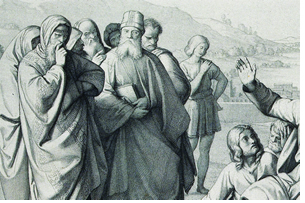Future Ready
Iconic football coach Vince Lombardi was fanatical in regard to fundamentals. Players who competed under his leadership often referred to his dynamism, intensity, and relentless enthusiasm for game basics. Repeatedly, he would emphasize the basic techniques required in blocking and tackling. When his team, the Green Bay Packers, outgained their opponent yet still lost the 1960 NFL Championship, the players began their new season with expectations of playing better, smarter, and more effectively.
The first day of training camp of the 1961 season did not begin as expected for the players. Coach Lombardi took nothing for granted, and would begin a tradition of starting with the basics. He assumed his players did not have any prior knowledge from the past season. He began training camp with the most basic statement possible. “Gentlemen,” he said, holding a pigskin in his right hand, “this is a football.” Lombardi then had everyone open their playbooks to page one, and he explained the fundamentals of the game.
Why would an experienced coach talk to professional athletes as Lombardi did? Apparently, it worked because the Packers won the NFL Championship that season (37-0), and Lombardi won five total in seven years, including victories in the first two Super Bowls. Lombardi never had a losing season as head coach in the NFL, nor did he ever lose a playoff game again. He was successful because of his simple philosophy that perfecting the fundamentals of the sport best attains excellence.
It is possible to understand something well enough and even perform well, yet still lose (as the Packers did in the 1960 Championship) if one neglects the fundamentals. The primary task in life is to make foremost what is most fundamental, which is certainly true in regard to the Bible’s prophetic teaching. While it is possible to exhaust all the future details in relation to the coming of the Lord, the fundamental purpose for the prophetic revelation of the Olivet Discourse (Matt 24—25) is to guide one to live wisely in the present.
The Bible reveals the future to give proper motivation and perspective for the here and now. Matthew 25 indicates the vast difference between passive and temporal attitudes regarding the future, and a wise perspective that makes eternal decisions. God wants people to live in view of His coming kingdom, resulting in a purifying hope, just as the Lord Himself is pure (1 John 3:3). Matthew 25 motives one to live a godly (holy and pure) life in view of the future.
BEING PREPARED
(Matt 25:1-13) Matthew 24 concluded with an exhortation to be ready for the Lord’s coming. Matthew 25 begins with a parable based upon the wisdom of those who are prepared for the coming of the Lord, in contrast to the foolishness of those who are not. Preparedness, readiness, and watchfulness are emphasized.
The parable of the ten virgins emphasizes wisdom (vv. 1-13). All ten had the same amount of time to ready themselves, yet five were foolish and five were prudent. Some took advantage of the time available to them and were ready for the coming of the bridegroom, who in view of Matthew 9:15 is Jesus Himself (which is bold imagery for Him to use, since the Old Testament frequently describes God [not the Messiah] as the bridegroom and Israel as the bride [Isa 54:4-6; Jer 2:2; 3:1-14; 31:32; Hos 1:2; 2:7, 14-23; 3:1-5; etc.]). The wise virgins “who were ready went in with him [the bridegroom] to the wedding feast [the Lord’s kingdom]; and the door was shut” to those who were foolish and unprepared (Matt 25:10).
 The difference is between the foolish and wise, as opposed to the bad and good; some were prudent and thoughtful, while others were imprudent and thoughtless. The penalty was severe for the foolish; they were not allowed to enter the wedding feast. When “the door was shut,” it would never be opened again. “I do not know you” (v. 12) is the decisive statement of rejection, and certainly the most solemn words from the One who said, “I am the good shepherd, and I know My own and My own know Me” (John 10:14).
The difference is between the foolish and wise, as opposed to the bad and good; some were prudent and thoughtful, while others were imprudent and thoughtless. The penalty was severe for the foolish; they were not allowed to enter the wedding feast. When “the door was shut,” it would never be opened again. “I do not know you” (v. 12) is the decisive statement of rejection, and certainly the most solemn words from the One who said, “I am the good shepherd, and I know My own and My own know Me” (John 10:14).
The message of the parable is simple: “Be on the alert” (Matt 25:13a). When the bridegroom comes, it will be evident who are saved (v. 4: had “oil,” an emblem of the Holy Spirit, cf. Zech 4:1-7). No one is ready for the Lord’s coming without the Holy Spirit. Hypocrites pretend to be what they are not or claim to believe what they do not; their behavior contradicts what they truly believe and feel. In antiquity, a hypocrite was an actor who assumed a character and would use a mask to conceal his true identity, portraying himself to others in a feigned manner. Hypocrisy is characteristic of the foolish who lack true faith yet claim to be saved (which is why they were classed among the virgins). Preparedness for the Lord’s coming proves whether one personally trusts and respects Him.
BEING FAITHFUL
(Matt 25:14-46) Whereas the parable of the virgins emphasizes spiritual alertness, the parable of the talents prioritizes faithful service (vv. 14, 19, 21, 23, 26, 30). The parable begins with a forthright assertion that a master departed “on a journey” and to “his own slaves . . . entrusted his possessions” (v. 14). The context would seem to indicate that the master’s departure was necessary, due to governmental affairs or a military enterprise—especially since the parable concludes with Jesus declaring that when He “comes in His glory,” it will be to judge “all the nations” (vv. 31-32).
Judgment is the context, as evident in the parallels: The master returned to settle accounts with his slaves, just as the Son of Man will return to judge all the nations. Understanding this context helps to enlighten the actions of the third slave, who wickedly buried all the possessions allotted to him, which is characteristic of wartime (Jerusalem would fall to the Romans in AD 70, which is the precise event prophesied in 24:2).
The master’s response to the third servant revealed that the servant’s motives were disloyal, evil, and unloving (25:26). His laziness was not because he lacked ability or opportunity; rather, he simply refused to invest himself in the master’s work, because he selfishly believed the dangers outweighed any faith-motivated risks (vv. 24-30). The other two slaves had faith in their master, and thus viewed his return as sufficient reason to invest the allotted resources during wartime (vv. 16-23). The master was angry with the third servant because he was faithless and selfish, by intending to use the master’s absence for his own personal expediency (cf. Luke 12:41-48).
The parable of the talents is a condemnation upon those with much privilege and responsibility (cf. Matt 13:12), yet who were characterized as barren and faithless (21:18-32). They served their own wretched desires (21:33-41), thus culminating in their own destruction (vv. 42-44). Only those alert for the Master’s coming “will be saved,” and thus able to share in the blessedness of His coming kingdom. As opposed to disloyalty, the Lord’s servants are to invest resources through radical, righteous, even risky obedience to Him (always by His grace and for His glory). Not remarkable success but faithfulness is what is rewarded.
The parable of the talents was given near the conclusion of Jesus’ earthly ministry. Prior to that parable, the Lord cleansed the temple by expelling the moneychangers (21:12-17). Subsequently, the Lord taught another parable depicting landowners (21:33-46), which represented Israel’s first-century religious leaders, who were responsible for shepherding God’s people. The purpose of the parable was to illustrate God’s judgment against them for their rejection of Jesus.
 Jesus also outwitted the religious leaders in their carefully designed and planned question regarding the payment of taxes (22:15-22), which was a far more volatile issue at that time than modern discussions. The timing of Jesus’ answer was critical, as it was a crucial moment when decisive action was needed on the Lord’s part. Borrowing a coin with Caesar’s inscription and likeness upon it (which, ironically, He did not possess yet those seeking to trap Him did), He said some of the most significant words in history: “render to Caesar the things that are Caesar’s; and to God the things that are God’s” (v. 21). The impact of Jesus’ words upon Western civilization is colossal, as the Lord acknowledged the legitimacy of human government (cf. Rom 13:1-7; 1 Tim 2:1-6; 1 Pet 2:13-17) while prioritizing the greater responsibility to God, who has created humanity and redeems believers by grace through faith.
Jesus also outwitted the religious leaders in their carefully designed and planned question regarding the payment of taxes (22:15-22), which was a far more volatile issue at that time than modern discussions. The timing of Jesus’ answer was critical, as it was a crucial moment when decisive action was needed on the Lord’s part. Borrowing a coin with Caesar’s inscription and likeness upon it (which, ironically, He did not possess yet those seeking to trap Him did), He said some of the most significant words in history: “render to Caesar the things that are Caesar’s; and to God the things that are God’s” (v. 21). The impact of Jesus’ words upon Western civilization is colossal, as the Lord acknowledged the legitimacy of human government (cf. Rom 13:1-7; 1 Tim 2:1-6; 1 Pet 2:13-17) while prioritizing the greater responsibility to God, who has created humanity and redeems believers by grace through faith.
The final section of Jesus’ discourse is not a parable (vv. 31-46) but a description of evaluation or judgment when the Son of Man comes in His glory (cf. 24:30). The only alternatives to the divinity of Jesus are that He was crazy or evil. He is either bad, mad, or God: a liar, lunatic, or Lord. Jesus said, “He will sit on His glorious throne” (v. 31), words indicating He was either guilty of megalomania (delusional regarding His importance or power) or He is truly the Lord of glory, who will judge all nations from His throne.
While the two parables of Matthew 25 highlight alertness and faithfulness, the closing verses of the chapter focus upon all nations. Jesus repeatedly emphasized the eternal destiny of those who are not faithful and true (cf. 18:23-34; 20:1-16; 21:33-41; 22:1-14; 24:45-51), and then revealed the necessity to be ready for the time in which He will divine all humanity into two categories: sheep and goats (25:32-33). One’s eternal destiny will be determined and unchanged when standing before the Lord of glory (vv. 34-46). Awaiting the Lord’s coming demands faithful readiness and resolve: accomplishing what God has uniquely prepared for you to do.
Midnight Call - 04/2024


